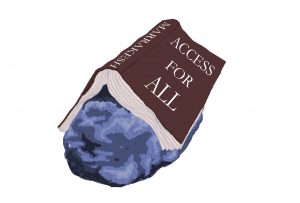
Paper covers rock: how the Marrakesh Treaty can move Canadian libraries out of the Stone Age
By Corinne Abba & Heather Buffett

In 2016, Canada became the 20th country to accede to The Marrakesh Treaty to Facilitate Access to Published Works for Persons Who Are Blind, Visually Impaired or Otherwise Print Disabled. Advocating a human rights informed approach to global accessibility and copyright, the treaty supports the creation, distribution and sharing of accessible copies for persons who are blind, persons who experience visual impairment, perceptual or reading issues, and/or persons who are unable to hold or manipulate a book.
Framed by our profession’s commitment to literacy and equitable access, Canadian academic libraries are well positioned to drive the work to overcome these diverse and intersectional barriers and, with the Marrakesh Treaty in place, we are now able to provide a sustainable model of sustenance in the face of the global book famine. But what are the parameters of this work and how can we, as library professionals, engage in and advocate for accessibility in productive, meaningful ways?
To support the global community, IFLA recently published Getting Started, an invaluable guide for libraries on the implementation of the treaty. In order to ensure accuracy for all nations, the guide does not delve into the specifics that vary under domestic law. Keeping in mind the information that follows is not intended to constitute legal advice, our goal is to provide responses to common questions encountered when working to implement the treaty across Canada.
Can Canada send accessible copies to countries who have not joined the treaty?
Yes. Canada’s Copyright Act (2012) already had provisions in place for providing accessible materials to persons with perceptual disabilities outside of Canada (32.01). These provisions have since been expanded with the ratification of the Marrakesh Treaty and under the Copyright Modernization Act (Bill C-11), and now make a distinction between member and non-member countries.
Do Canadian libraries have to pay royalties for these accessible “copies?”
Yes. Royalties may need to be paid depending on the regulations attached to the different formats in question, as outlined in sections 32.01(4) and 32.01(7) of the Copyright Act.
Do we have to use a commercially available version, if available?
Yes. If the particular accessible format can be “obtained commercially under reasonable terms within the Canadian market or within the destination market,” then a commercially available version must be used. The same requirement applies domestically and internationally.
What is the treaty’s impact on the digital lock provision in Canada?
Section 41.16 of the Copyright Act is applied as it was prior to the Marrakesh Treaty: digital locks can be broken for persons with perceptual disabilities to fulfil the requirements under section 32.
What about e-resource licenses and vendor contracts?
In Canada, there is no reference to legislation superseding contracts on this matter. As such we should refer to the specific terms of each license, which will vary case by case.
What are the record keeping requirements in Canada?
Libraries are recommended to establish local procedures to maintain records in accordance with general best practices and are advised to refer to the reporting clause in the Canadian Copyright Act 32.01(6) as needed.
Recommended resources:
- IFLA (2018). “Getting Started: Implementing the Marrakesh Treaty for persons with print disabilities. A practical guide for librarians.”
- EIFL (2015). “The Marrakesh Treaty: an EIFL Guide for Libraries.”
- The World Blind Union (2017). “Pocket Guide to the Marrakesh Treaty”
Corinne Abba is AODA Coordinator for Diversity, Equity and Human Rights Services at George Brown College. She can be reached at cabba [at] georgebrown.ca
Heather Buffett is the Copyright and Open Access librarian at George Brown College. She can be reached at hbuffett [at] georgebrown.ca
Header image by Wokandapix (CC-0)


